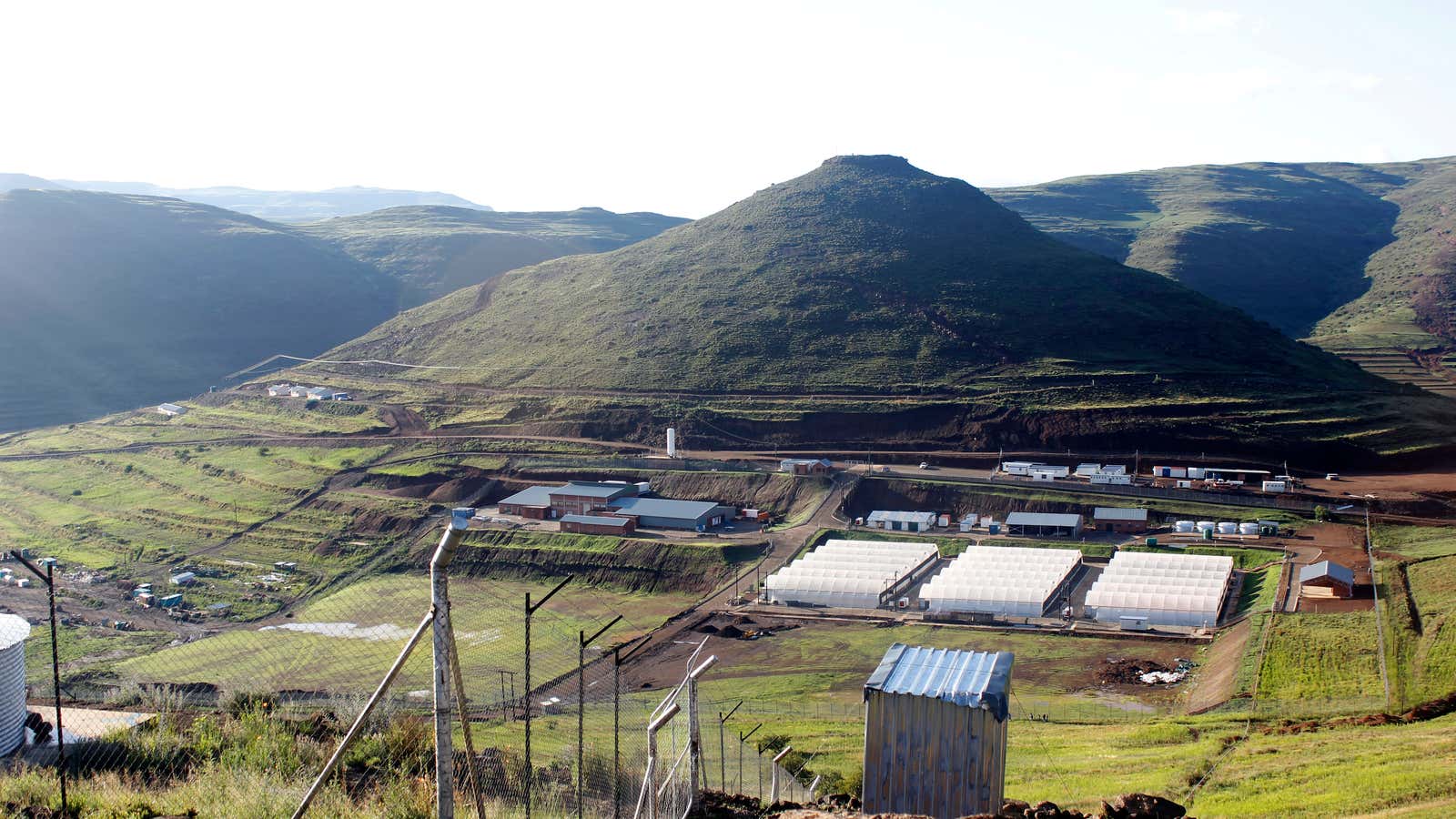*In partnership with Cannabis Wire
Dawn breaks in the village of Marakabei, two and a half thousand meters up in the remote highlands of Lesotho, the landlocked kingdom surrounded by South Africa. Cowbells tinkle. Smoke from cooking fires rises above homes along the steep hillsides. An old donkey path winds around the edge of a peak.
And then there are the workers walking it, each wearing overalls in a color denoting their function—blue for construction, green for cultivation. At the end of the path, they press their thumbs to a biometric scanner, pass through a turnstile, and enter a different world.
Here is the first glimpse of one of Lesotho’s biggest commercial cannabis farms. After the biometric scanner comes more than a dozen poly tunnels, each the size of a tennis court, growing medicinal cannabis in an environment controlled for heat, light, and moisture. They are surrounded by fences, guard posts, more turnstiles, more scanners, roads carved out of the hillside, and tractors zipping up and down, ferrying piles of dirt to yet more construction sites. The farm represents what could be a revolution in the fortunes of one of Africa’s poorest countries, the kingdom of Lesotho. If the kingdom can get it right, that is.
****
In 2017, Lesotho became the first nation in Africa to issue licenses for the production of medicinal cannabis. International investment quickly followed in 2018. What is produced will be for export to companies around the world, where it will be processed into cannabis products. Some of the world’s biggest cannabis companies listed on the Canadian and New York stock exchanges have invested in Lesotho’s fledgling industry, forming partnerships worth millions of dollars with local companies. The country’s high altitude and abundant water—accessible through the dam system—make it an ideal environment in which to grow.
In March 2018, a Canadian company, Supreme Cannabis, made a C$10 million ($7.5 million) investment in the Marakabei farm, Medigrow. Hot on its heels, the Canadian giant Canopy Growth paid more than $21 million to acquire a local Lesotho company, Daddy Cann, in May 2018. In the same month, the Canadian company Aphria formed a joint venture with Verve Dynamics, which has a growing site in Lesotho, a deal worth $3 million.
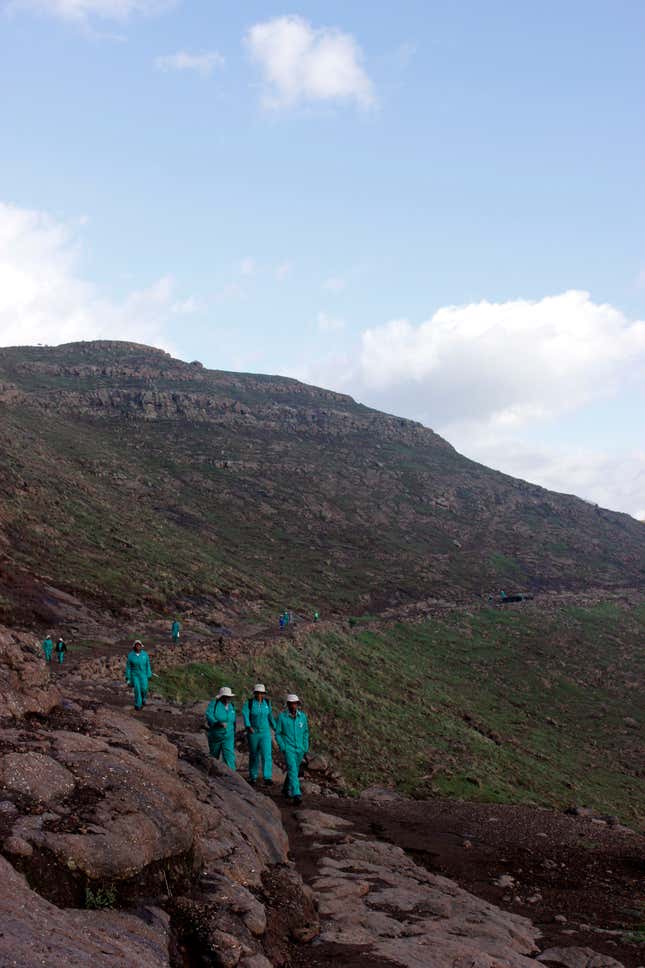
The dollars at play are not huge in comparison to those in Canada or the US—in what has become a $12 billion global business—but they are very big here. Up to 80% of the 2.2 million-strong population of Lesotho is dependent on subsistence farming, a livelihood that has been made more unstable by frequent and persistent drought. In the past, Lesotho’s men were able to go to neighboring South Africa to work in the mines, sending money home. But in the decades since the end of apartheid, when South Africa began prioritizing its own labor for mining, those jobs have dried up. The economy is stagnant. Thanks to widespread free primary education, Lesotho’s people are highly literate. But there are no jobs.
Commercial cannabis has the potential to change this. “Cannabis is going to set free this country,” says Dr. Emmanuel Letete, an economist in Lesotho’s Ministry of Development Planning. “Although people don’t see it yet.” Where the kingdom’s mountainous geography once meant that it missed out on big agribusiness opportunities, this time its altitude could be the key to its fortune.
The way is fraught with risks, however.
At the national level, the potential for mismanagement or corruption is high. Already in Lesotho, allegations abound of licenses that were handed out on the basis of connections rather than competence. Within two years of the first licenses being granted, the process has been so chaotic that the government itself is unsure of how many licenses exist, reducing their value and dissuading investment. It is working to clear up the disorder.
The stakes are high, both for Lesotho and its new cannabis industry, to get things right.
***
For some of Marakabei’s residents, the arrival of Medigrow, a Lesotho company, has been revolutionary. This year, the company employed more than 350 locals, providing a regular salary to a workforce 70% of whom have never had a job. By 2021, the company plans to have 96 poly tunnels and to employ the entire village, according to its chief executive, Andre Bothma.
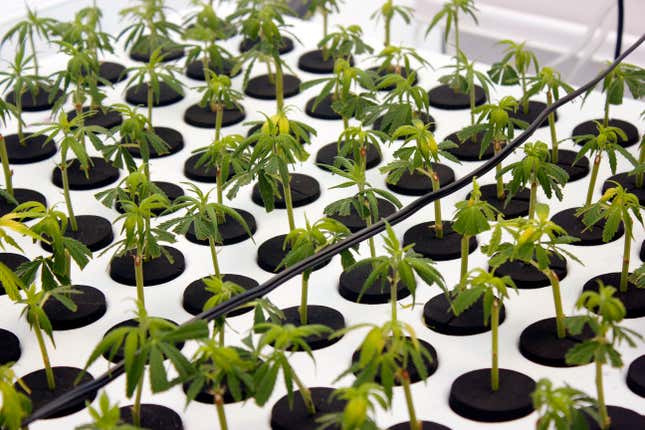
In the late afternoon in Marakabei, Tselisa Bohloko still wears his Medigrow work uniform—a green jumpsuit and floppy sun hat provided by the company—and has just finished his English class for the day, also provided by the company. He drives a tractor at the farm. “I’m having new dreams,” he says of his new job. “I can see them clearly now.” He’s going to build his own house. It will be a big one, he says, with electricity. Bigger than the chief’s, he laughs.
Another Medigrow employee, Itumaleng Tlhakanelo, is the first Lesotho-born staff member to be promoted to “grower”at the Medigrow farm. Before her, the growers were all internationals, many of them South African. Rather than routine maintenance like watering, undertaken by her local colleagues, she has been trained in taking cuttings from parent plants to breed new ones. After six months the earnings have made a difference. “I’m developing things,” she says, referencing a new car and new clothes for her children. “I can go places with cannabis, I’m telling you.”
Lesoa Lehohla is statesman-like—measured and thoughtful when discussing the country he has represented for almost two decades, as well as its unique history with cannabis. He has been active in Lesotho politics since the time of independence, serving as a government minister from the end of military rule in 1993, until 2012.
Despite the international excitement around Lesotho as a new growing destination, cannabis is not new to the people of his country, known as the Basotho, Lehohla explains. People in Lesotho describe how their parents or grandparents boiled or ground or brewed cannabis to make cures for particular ailments, from headaches to flu to colic in babies.
But British colonialism took much of the Basotho’s traditional lands and, along the way, the right to use cannabis, banning it. In 1868, Queen Victoria agreed to a treaty with the Afrikaners to end years of territorial conflicts. With the stroke of a pen, half of the traditional land of the Basotho people was handed to the Afrikaners.
The Basotho never accepted the loss of their land—or their cannabis, their matekoane, Lehohla says—and as an independence movement gathered pace, it also gained a slogan: “We want our land back, together with our cannabis.” As Lehohla sees it, “The political argument—that the country, the lost territory and the matekoane must be recovered—resonated so well because no Lesotho citizen in their right senses had supported the banning of cannabis. It was just an imposition.”
Along with tradition the reasons include household economics. In Lesotho, cannabis provides much needed additional cash income, allowing farming families to pay school fees or visit a doctor. And the practice is widespread. Cannabis is is a key source for hard currency for Lesotho.
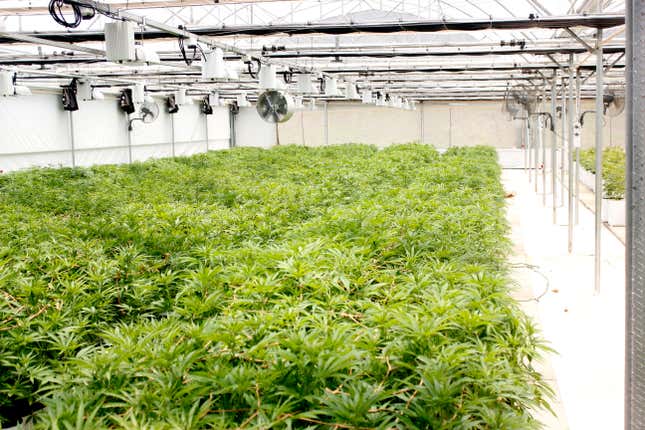
Lesotho MP Sam Rapapa is from Mapoteng, an area of Lesotho where illegal cannabis production is commonplace. And he has his own story. His mother was a subsistence farmer and began growing cannabis herself after his father died, he says, selling it to smugglers from South Africa. The proceeds funded his and his siblings’ education, he says. He is one of the so-called “children of marijuana.” So is his brother, the minister of Education.
Despite its close ties to the Lesotho national identity, growing cannabis on a small scale remains a criminal offense. Yet for the select few growing it on a large scale with a license, this is no longer the case. The Drugs of Abuse Act of 2008 allows for cannabis to be cultivated under a license from the Ministry of Health, although the regulations making the law operative only came a decade later, after international companies showed an interest.
The problem for local Basotho is that, after an initial period where licenses were allocated without charge, the government has now applied a fee: 500,000 maloti, or $35,000, well beyond their means.
Small scale growers across the country, who currently sell to the black market, are asking why their cannabis crops cannot be processed and exported legally, along with the commercially grown plants.
And there are reasons. Tomas Sadilek, director of governmental affairs from the International Cannabis and Cannabinoids Institute, says selling local, small scale growers’ cannabis into the international market would be almost impossible. Consistency of strains is a necessity for medicinal cannabis. So is freedom from pesticides. “The problem is when you are talking about medical cannabis, you have to create an environment where you are 100 percent sure of what you are growing, and that’s impossible in your garden.”
***
The family of Andre Bothma, CEO of Medigrow, has been in Lesotho for three generations, and as the late afternoon sunlight streams through the windows of his boardroom in Maseru, he outlines his plans. At Medigrow, he says, he hopes to eventually hire every resident of Marakabei who wants to work for him, which would, by extension, eradicate the need for anyone to grow cannabis illegally for cash.
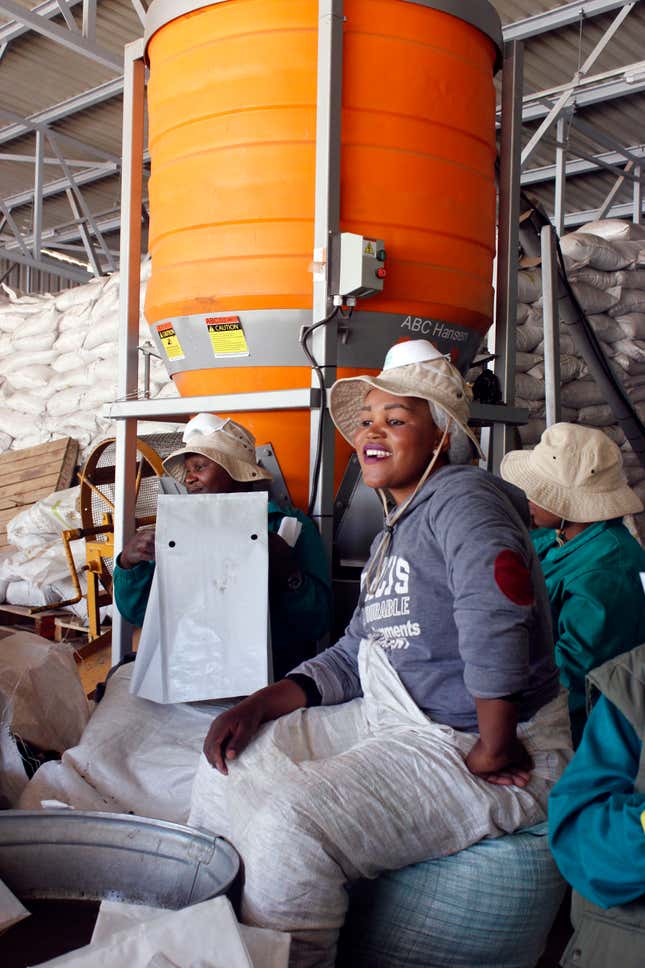
The company has begun by hiring those who can speak English, supporting those employees whose level is basic, but passable, with extra tuition for language classes. For those who are not literate, he wants to set up a vegetable farm that will supply Medigrow with food for the workers’ daily meals, and thus create jobs for those lacking the education required to work on the high-tech cannabis farm.
“What drives me is not money, it’s creating jobs,” he says. “This product can change people’s lives, alleviate them from pain. So we’re going to have customers whose lives we can make better, and we’re going to change a lot of lives for Basotho here. We’re going to build a business for generations. We’re not here to make a quick buck.”
Meanwhile, the minister of Finance, Moeketsi Majoro, also wants to see commercial cannabis companies forming partnerships with the communities in which they establish themselves. Land should remain in the hands of communities, it should never be bought, Majoro says. Landowners should become foundational shareholders in the companies, or communities should form joint ventures with the big players.
“Communities should be the ones laughing all the way to the bank,” Majoro says.
“And by the way, there should be a bank built where they are, so they don’t laugh too long!”
Nkaku Kabi was appointed to the Ministry of Health in February 2018, and so became a central figure in Lesotho’s young cannabis industry. On behalf of the government, the Ministry of Health allocates licenses to produce medicinal marijuana. (That authority is in the process of being transferred to a newly formed Lesotho Narcotics Bureau).
But the process of allocating licenses at that time was disordered, he admits. “They gave me licenses to sign and at that time I don’t know what I was doing, because when they brought the paper, I just signed,” he said. “We were operating blindly without knowing what we were doing.” The government has been trying to clean things up. “We have realized this is the biggest industry. It’s even bigger than other mining industries,” referring to Lesotho’s small diamond mines. “It has to be handled with care.”
But it had a bumpy start. Lesotho’s Drugs of Abuse Act 2008 legalized production of cannabis under license, and then this fact seems to have been all but forgotten. Then in 2016, Andre Bothma approached the ministry with his proposal to begin commercial production at Marakabei, and in 2017 his license was granted, along with three others, part of a pilot program, says the then-Minister of Health, Molotsi Monyamane.
But an election in 2017 led to a change of government, and two health ministers who followed Monyamane were less cautious in their approach to licensing. For a time licenses were free, obtained without fee, and were given out with little oversight, allegedly to those who could muster the funds to pay off an official, says Monyamane. At the present time minister Kabi himself isn’t clear on how many licenses have been allocated, estimating it is between thirty and forty.
Regulations to govern the new sector were only developed in 2018, after many licenses had already been allocated. Now the government is trying to clean up the mess, but some worry that in the chaos, an opportunity could be lost.
Albertus Kleingel, a South African lawyer who has worked on the allocation of some of the licenses, says he has been approached by companies from all around the world who want to invest in Lesotho’s cannabis industry, but are frustrated that, for now at least, they are unable to negotiate directly with the government to get a license. The Ministry of Health has put a stop to new licensing while it works out who currently holds a license, leaving those looking for a license to lopsided negotiations with local actors.
“You have to pay a premium,” says Kleingeld. In January of 2019, he said, the going rate to buy a license from one of these middlemen was between 20 and 25 million rand (about $1.4 million to $1.7 million), many times higher than the government fee.
Meanwhile, “what we have to be cautious of,” Kabi points out, “is giants who come from Britain, from America, from Canada, they come and just sweep up every license without Basotho having the opportunity to have some shares. We are working on a strategy, a way to incorporate Basotho.”
The license fee was raised in May 2018 to where it stands now, and all current license holders have been asked to pay the fee, even those who paid nothing in the first place. This leaves Kabi with a problem: Should he withdraw licenses from those who can’t pay, most of whom are locals?
“Now we have a little dilemma, because they are Basotho, but they can’t raise the 500,000 rand,” he says. “But if you can’t raise the 500,000, how are you going to run this industry. Because it’s not a small-boy industry, it’s a giant industry.”
This article was published in partnership with Cannabis Wire, a news organization that publishes smart coverage of cannabis business, policy, and research
Sign up to the Quartz Africa Weekly Brief here for news and analysis on African business, tech and innovation in your inbox
